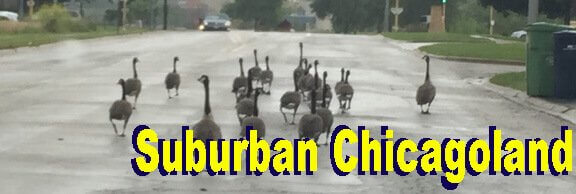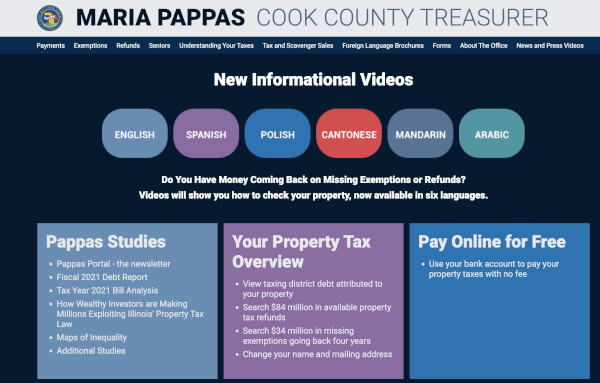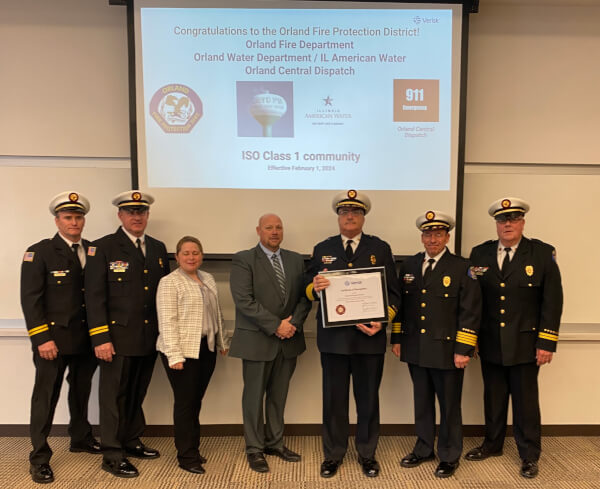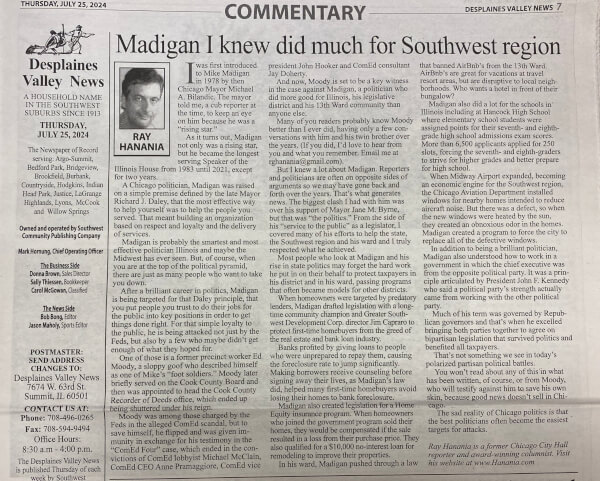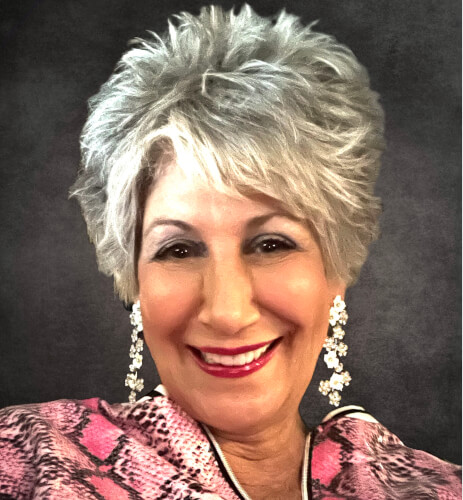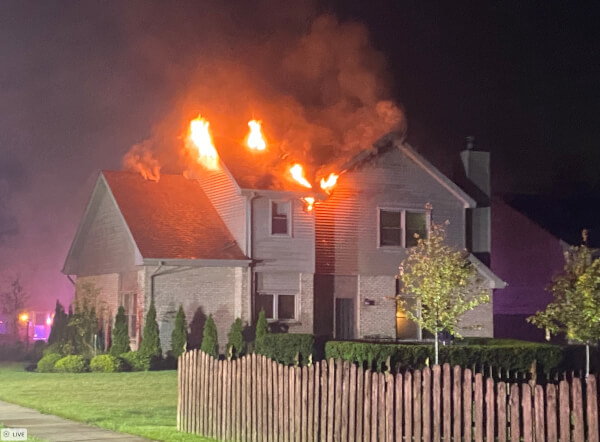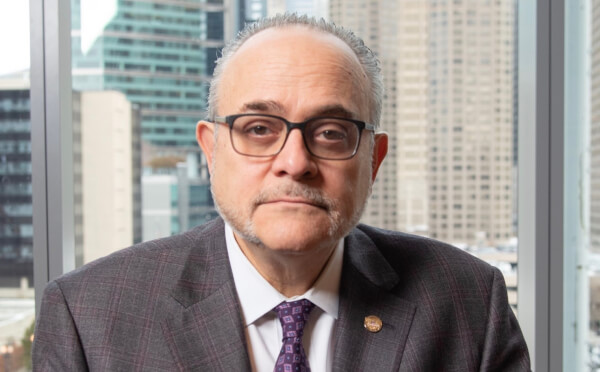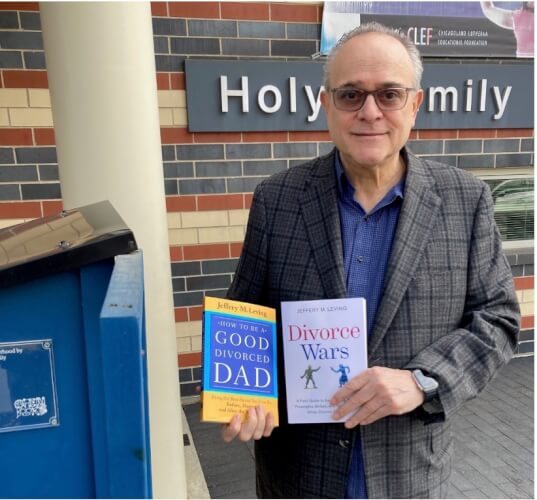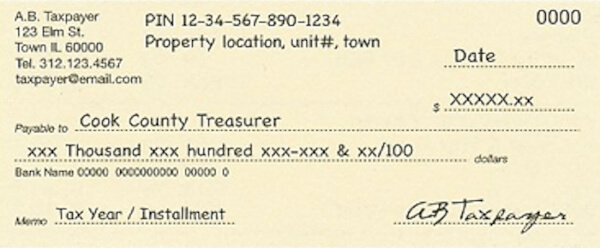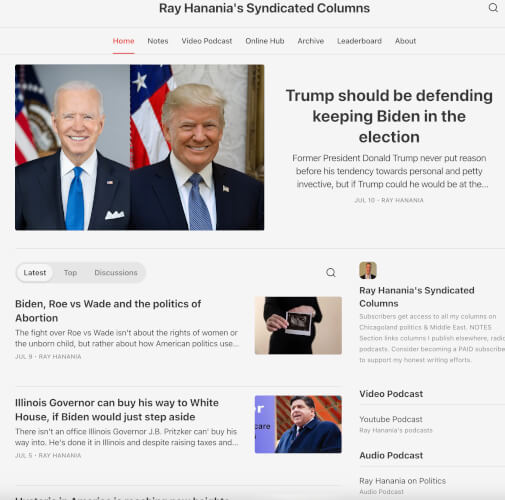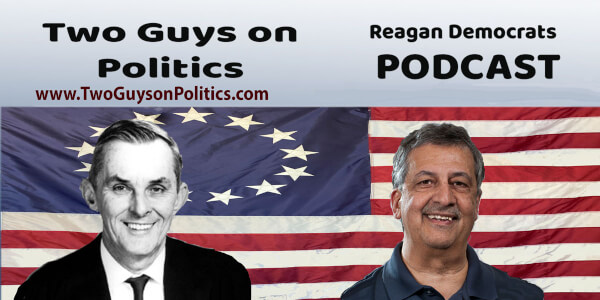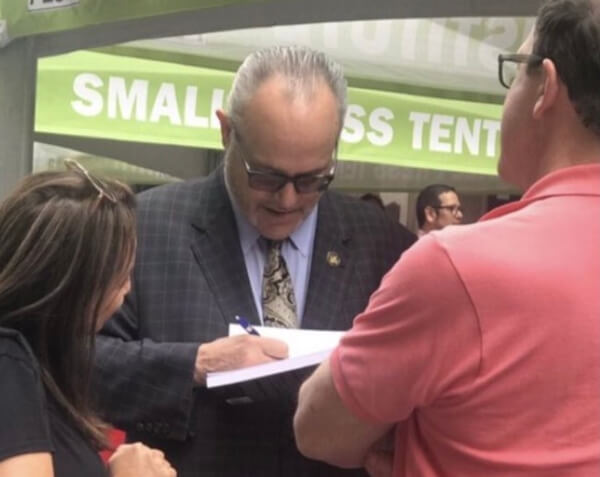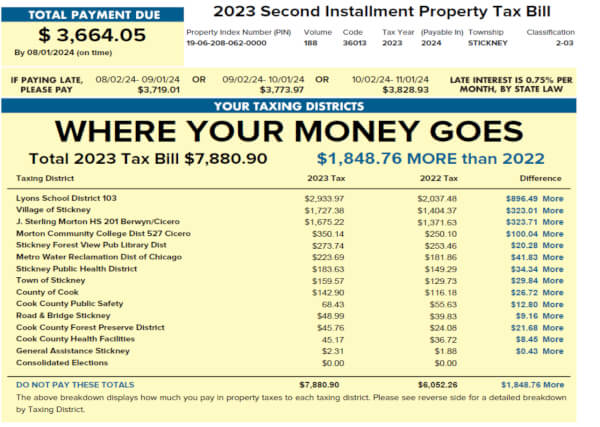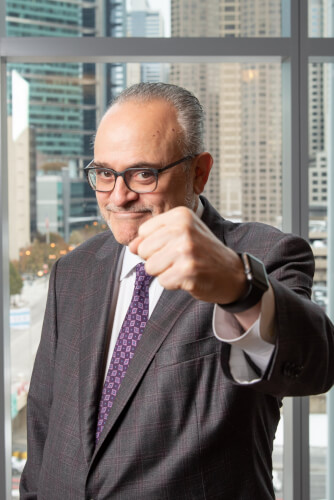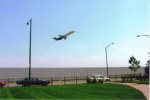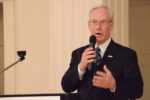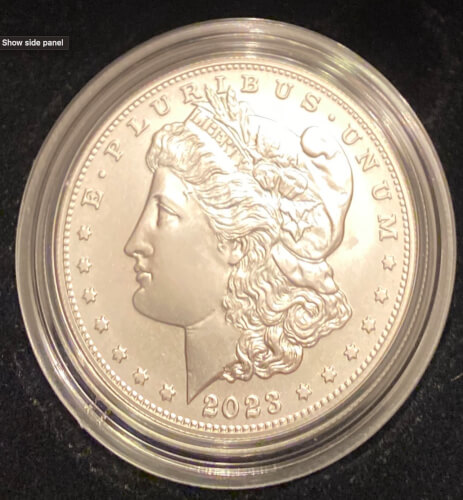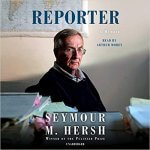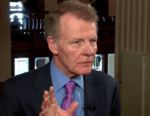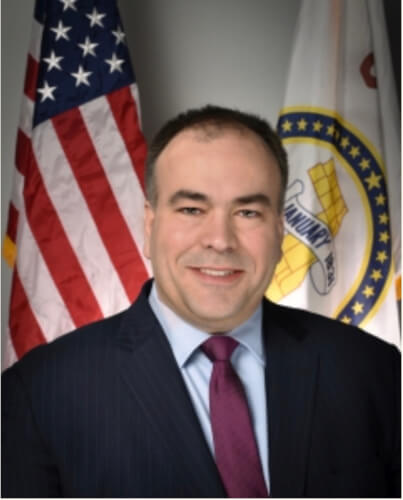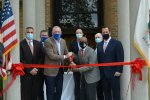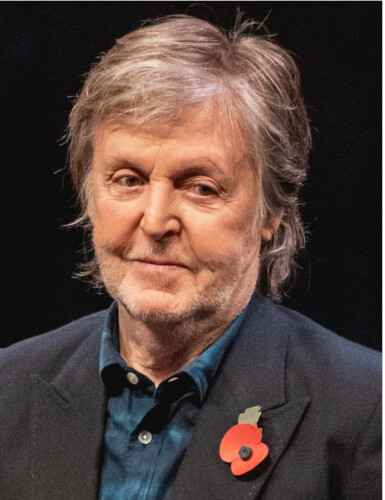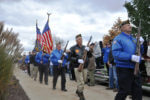Analysis: Why Pekau won and McLaughlin lost
A poorly run re-election campaign by seven-term incumbent Mayor Dan McLaughlin combined with a hot-topic issue of salary and pension hikes, and a laser-focused issues campaign of a non-political challenger, Keith Pekau, running on the Republican Party banner did what no one thought could happen April 4 in Orland Park. McLaughlin lost because he failed to speak to the key issue and Pekau won by focusing on the one issue that angered voters.
By Ray Hanania
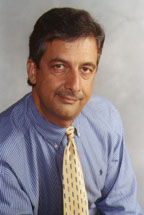
That single issued galvanized anger among voters and pushed more than 4,000 voters who never voted in past elections to go to the polls and elect his challenger Keith Pekau, a mild-mannered successful businessman who decided to run as a Republican rather than as an “independent.”
McLaughlin was a Democrat whose very first election was backed by the powerful 19th Ward Democratic organization in 1983, when I was introduced to him and he was elected to the village board as a Trustee. With 19th Ward support, McLaughlin was elected mayor in 1991 and has reigned ever since as a part-time paid leader who kept his job with Chicago’s downtown unions.
McLaughlin ran unopposed in 2013 and in 2005, and his last challenger was Gerald Maher in 2009. When you look at the total vote in those three elections, they were 9,248 in 2005, 8,539 in 2009 (McLaughlin 5,465 to Maher 3,074), and a paltry 4,346 total votes in 2013.
In Tuesday’s election April 4 between McLaughlin and Pekau, a record 12,688 people went to the polls to vote with McLaughlin winning 5,784 votes, slightly more than his strongest historic base, while Pekau attracted an amazing 6,904 votes.
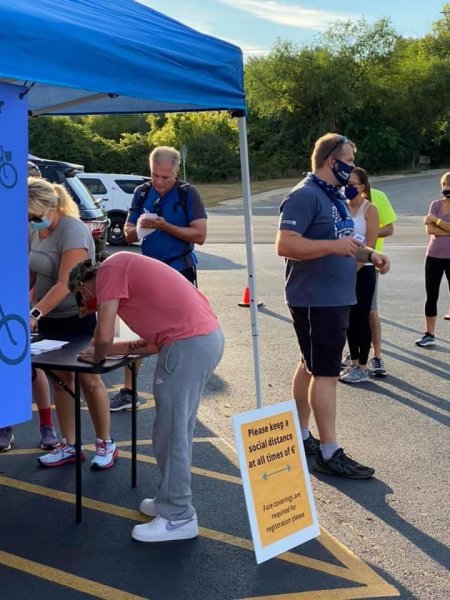
Nearly 4,000 additional voters decided to go to the polls in Orland Park on April 4, 2017 above the record set in 2005.
Why?
Normally, McLaughlin’s huge campaign contributions from hardcore Democratic Party sources, unions and businesses that have backed him during his 23 years without a concern of backlash, would allow him to dominate any election.
Mayor McLaughlin points to the infusion in the election of nearly $200,000 from the Liberty Principles PAC, run by popular radio talkshow host Dan Proft which purchased commercials on many popular cable TV news programs. But the truth is that those commercials were seen not just by Orland Park residents but my residents in the Cook County region, most of whom could not vote in Orland Park.
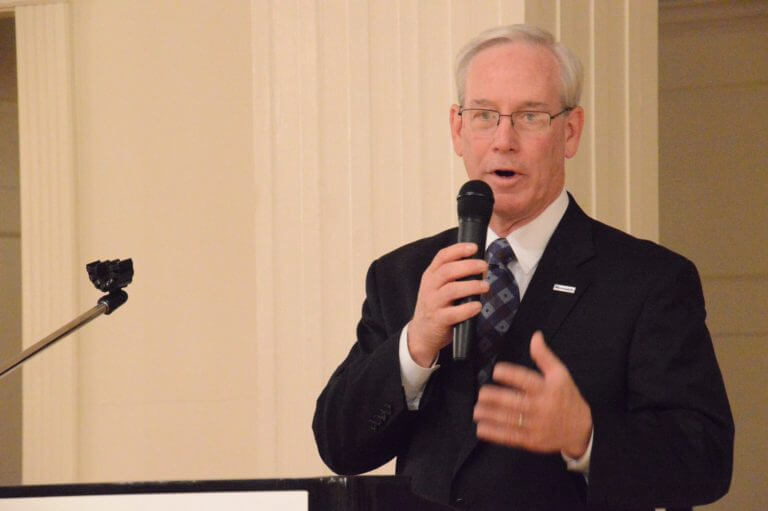
To pretend that McLaughlin did not have the same level war chest of funds at his disposal is ridiculous.
The commercials did one thing, though. They indirectly underscored Keith Pekau as a serious contender. The PAC cable TV commercials never mentioned Pekau as a candidate and instead focused on McLaughlin’s salary and pension hike. Clearly, the PAC money did not decide the election at all.
McLaughlin ran a poor campaign that reflected over confidence and maybe even some arrogance, although McLaughlin is personally a soft-spoken and decent person.
The McLaughlin campaign wasted funds sending two, three and four of the same campaign literature to the same household. There were so many mailers they were annoying. And even some homeowners who received them told me the excessive mailings reflected a lack of concern for money. And that played into the growing concern of taxpayers that McLaughlin’s salary and pension grab was a reflection of his lack of respect for taxpayers and tendency to spend wastefully.
Additionally, McLaughlin’s mailers were negative attacking many people who had nothing directly to do with the election including other suburban mayors.
Pekau, on the other hand, mailed only a few mailers to voters, with tighter spending that targeted voters. He focused on the issues that was most important to voters, the village’s finances, salary and pension spike.
So how did nearly 4,000 more voters go to the polls? What prompted the to act?
The answer is simple. Party politics.
Republican party support gives Pekau major boost
Pekau acknowledged that he did not plan to run for mayor but instead was motivated to throw his hat in the ring when no one else did in the weeks after McLaughlin and the Village Board decided to vote to give McLaughlin a massive pay hike that would create an obscene pension for him in October 2016.
Less than 100 people attended the Orland Park Village board meeting on Monday night October 17 when the board voted to increase McLaughlin’s salary from $40,000 a year to $150,000 a year. Although the pay hike angered residents and raised questions about why the salary hike was needed, it soon became apparent that the salary hike would create an obscenely high pension payment of more than $110,000 a year that McLaughlin would earn after serving only one term (four years) in office had he won the April 4 election (2017-2021).
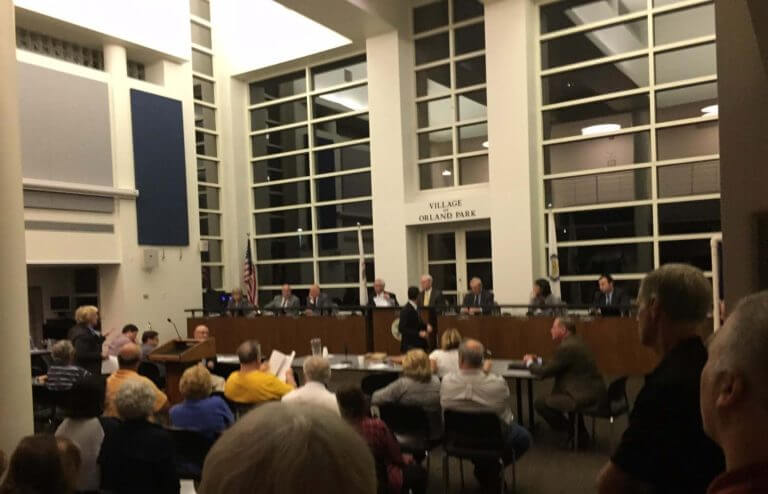
That salary spike angered many voters, especially the large voter constituency of senior citizens, most of whom are barely able to keep up with escalating costs on their small pensions.
Pekau announced his candidacy weeks later in November, but even then, McLaughlin’s camp was confident the salary and pension grab controversy would blow over. No one significant had challenged McLaughlin and Pekau had no money to come near the tens of thousands that were at McLaughlin’s disposal personally and in two campaign funds he controlled.
It wasn’t until March that the campaign started to heat up and the Tipping Point was reached when the Republican leadership decided to support Pekau’s candidacy.
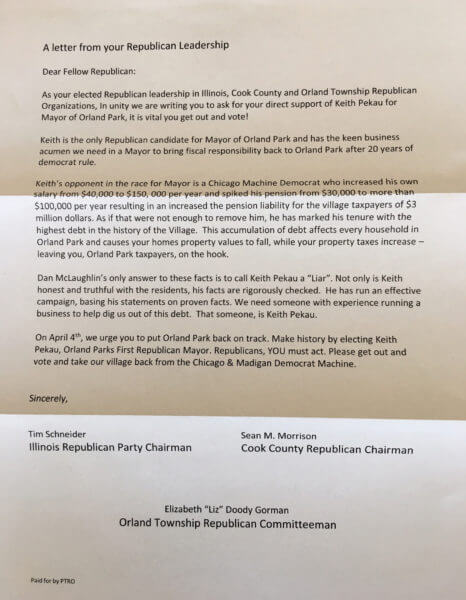
A letter was mailed in early March urging Republicans to vote for Pekau in the April 4 election. The letter was signed by Cook County Commissioner Sean Morrison, Orland Township Republican Committeeman and former County Commissioner Liz Gorman, and Tim Schneider, the Illinois Republican Party Chairman.
That letter moved voters, those who had voted in the past and more importantly thousands of others who had not voted, to pay attention and go to the polls.
McLaughlin is blaming Liberty Principles PAC for his demise but that GOP letter galvanized the Republican vote. And historically, Orland Township has been and always will be a Republican Party stronghold made up not only of conservative and centrist Republicans, but also a large number of so-called “Reagan Democrats” who fled Chicago in the 1980s who are basically conservative Democrats.
The Schneider, Morrison and Gorman letter put the spotlight on the issue of the salary hike and the pension spike. The letter was important because the news media was not covering the issue any more after giving it some splash in the previous Fall.
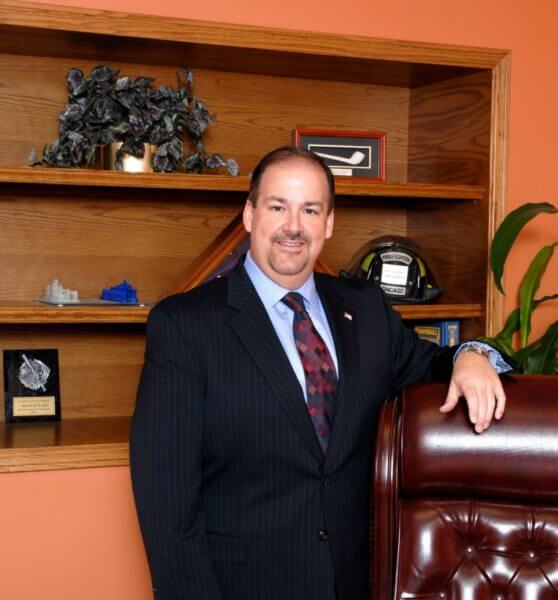
Gorman, who retired from public office on July 22, 2015 when she was succeeded by Sean Morrison, was one of Cook County’s most popular elected officials. Voters supported Gorman because she her primary issue was holding the line on taxes and fighting wasteful spending. She led the fight against the Sales Tax hike proposed by Todd Stroger and although it was approved in several votes, she managed to get it repealed.
The letter hit on a very important fact. When Pekau would question McLaughlin’s pay hike and pension grab, McLaughlin’s literature attacked Pekau calling him a “liar.”
But voters knew Pekau was not lying.
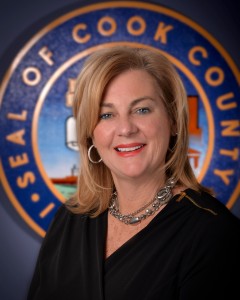
McLaughlin had hoped that he might appease Republican voters by aligning himself with James Dodge, who once served as the Republican Township Committeeman from 1994 to 1996, which he used to get himself elected as a trustee on the Orland Park Village Board. In 2010, Dodge sought to challenge one of the Republican Party’s most popular Republicans besides Liz Gorman, Judy Baar Topinka as state Comptroller. Topinka defeated Dodge but died shortly after her re-election four years later. Dodge’s Republican credentials were too weak.
And that was significant in Orland Park because Orland Park was one of the few communities in Cook County that voted overwhelmingly to support Donald Trump as the Republican presidential candidate against Democrat Hillary Clinton.
In the November 2016 Presidential election, Donald Trump received 50.4 percent of the vote in Orland while Hillary Clinton received only 44.4 percent.
Other issues impact Orland’s changing environment
In the 1970s and 1980s during the wars between Jane M. Byrne and Richard M. Daley, the 19th Ward once held powerful sway over regional politics. In the 1980s, the 19th Ward began branching out to create a political base in Orland Park which was built on land sold by former pig farmers. The land was soggy, with a strong clay base that made it prone to flooding.
But it was a perfect place for the 19th Ward to build what they hoped would be a Democratic satellite community to extend their influence.
It didn’t quite work out that way. One 19th Ward precinct captain who now lives in Orland Park told me days before the election that they had lost the fight when Gorman entered the race and it became a Republican-Democratic battle.
“We had our run,” he sighed.
Their influence ended when they locked horns with Gorman back in 2011 forcing Pat Maher to bow out under a siege of controversy from local politics. Maher was a scion of the 19th Ward Hynes family dynasty.
Orland Park has had issues with the small community of Arab Muslims and the building of a Mosque on 104th Avenue. Ironically, the majority of Arabs in orland Park are Christian who felt left out by the village’s support of Muslim community leaders including appointments, events and funding.
Most Christian Arabs voted for Pekau while the Muslim Arab community mailed several letters supporting McLaughlin to voters. One of the casualties of this political segue was the loss of David Shalabi who McLaughlin had appointed to the Orland Elementary School District 135 board in 2015. Shalabi was one of five candidates running for the four available seats, but ran in last place. Shalabi was on the ticket supported by the other three incumbents.
Many residents were angry with the Mayor for pushing a Sales Tax hike of .75 percent on Orland Park retail sales in 2009. To justify the increase in the sales tax, McLaughlin promised to refund 100 percent of the local property taxes to homeowners. By last year, the 100 percent promise had fallen to only 45 percent of local property taxes paid. The property tax rebate was less than half of what it had been in years past, although the sales tax revenues have continued to increase to strengthen the village’s financial standing.
Voters have been burdened and hassled by more than five years of disruptive construction on LaGrange Road. The construction was constantly delayed and roads were ripped up and redone repeatedly. The project was to have been completed last Fall, but minor construction continues to be an inconvenience even until now.
LaGrange Road may not be fully finished until later this year.
And many residents are still wondering why the Mayor and the board pushed through a massive construction project, the Orland Triangle at 143rd Street. The huge multi-floor buildings are an eyesore and such a contrast to the suburban style that Orland Park has managed to preserve despite a rise in retail commercial space and the Orland Park Mall.
Rumors of internal borrowings to cover the costs of the construction had dogged the mayor and were a minor issue in the election.
Finally, Pekau got a big boost when former Village Trustee and former Mayor Ed Schussler put out a robocall challenging McLaughlin’s claim that the village board had urged him to take a full-time salary and pension. Pekau was telling everyone he would reject the pension and reject the salary hike.
The whole salary explanation seemed suspicious when Dodge insisted that the salary was only good during the upcoming term of office, suggesting it was crafted simply for McLaughlin’s benefit. Schussler insisted that the McLaughlin had been talking about increasing his salary and becoming a full-time mayor more than a year before the issue surfaced at the last minute before the election in October 2016.
Schussler argued that they planned to boost McLaughlin’s salary all along but held it back until it was almost too late for anyone to mount an election campaign to protest, by introducing it at the last minute in October 2016.
In fact, I wrote a column in Sept. 2015 quoting several sources that McLaughlin wanted to leave his downtown union full-time work and instead become the full-time mayor of Orland Park with a matching salary.
Clearly, not everyone was paying attention.
